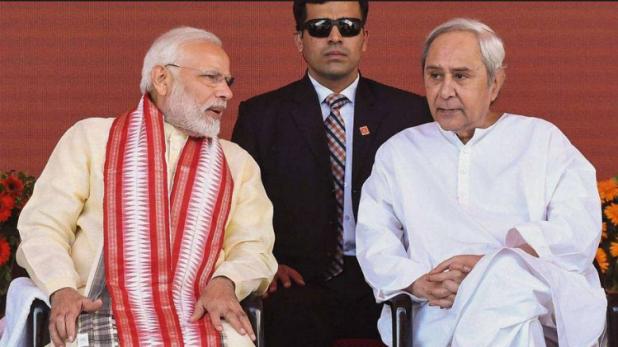Of late chief minister, Naveen Patnaik has been friendly towards top BJP leaders including Prime Minister, Narendra Modi. His party helped send BJP candidate, Ashwini Vaishnav to the Rajya Sabha. But the state so far has not gained much from all this. Time Odisha extracted some benefits.
Ever since BJD’s spectacular victory in the recent assembly elections there has been speculation if chief minister, Naveen Patnaik will be more aggressive in raising the demands of Odisha, specially the demand for special category state.
But this period has also seen Patnaik coming closer to the top BJP leadership, specially Prime Minister, Narendra Modi. In one of the most important developments the BJD helped send BJP candidate, Ashwini Vaishnav to the Rajya Sabha. This set off speculation that Odisha is going to get major concessions from the Centre. This has not happened.
Recently union minister of state for finance, Anurag Thakur told the Lok Sabha that Centre was not considering any proposal to grant special category state status to Odisha. There was also no move to increase Centre’s share of funds for centrally sponsored schemes in the state.
Thakur’s statement must have been a blow to Odisha government and the ruling Biju Janata Dal (BJD) leaders as chief minister Naveen Patnaik has been consistent in demanding special status for the state. He is believed to have taken up the issue with Prime Minister, Narendra Modi when the two leaders met in New Delhi recently. Patnaik had also asked Modi to declare cyclone-hit Odisha as a ‘ special focus’ state and grant it the same benefits as a special category state for a period of time.
Interestingly, Centre’s denial follows Patnaik’s friendly overtures towards the BJP whose candidate, former IAS officer, Ashwini Vaishnav was elected to the Rajya Sabha from Odisha recently with BJD’s support. Given the brute majority Odisha’s ruling party enjoys in the state assembly it could easily have won all the three Rajya Sabha seats for which by-poll was held recently.
But Patnaik decided to gift one seat to the BJP apparently following a request from Prime Minister, Narendra Modi and union home minister, Amit Shah. Normally such moves are seen as quid pro quo arrangements. Hence it is reasonable to assume that BJD government would expect some special concessions from the Centre.
But nothing of the kind seems to have happened so far. Instead Odisha has faced embarrassment because of certain decisions taken by the Centre, a glaring example being its decision to grant a two-year work extension for the Polavaram project in Andhra Pradesh which the Naveen Patnaik regime has been opposing consistently. The project, for which a public hearing is yet to be held in the affected areas of Odisha, threatens to submerge a cluster of villages in the tribal-dominated Malkangiri district of the state.
That raises a very pertinent question—what has BJD gained by extending support to Vaishanav and helping increase BJP’s numbers in the Rajya Sabha. In the backdrop of developments taking place in the wake of Vaishnav’s election this query assumes an intriguing dimension. While ruling BJD leaders have no explanation for this except saying that the decision must have been taken in the larger interest of the state the BJP leaders of Odisha couldn’t care less. They are just happy that one of their leaders has gone to the Upper House of the parliament where the party still lacks a majority.
The situation has led to theories to explain Patnaik’s move, one of these being the fear of CBI which is probing the chit fund scam. The central investigating agency had arrested some BJD leaders in connection with the scam and they are still under its scanner. The Centre, hence, is in a position to use the CBI to bring the Patnaik government under pressure. One wonders if this could be the reason for BJD’s support for Vaishnav.
On the other hand chief minister of Odisha, Naveen Patnaik has donned the role of teacher for his ministers and MLAs. He has been imparting tips to make them better people’s representatives and administrators.
In his first meeting with the newly elected Biju Janata Dal (BJD) legislators he advised them to shun all kinds of ostentation and earn the respect of people by leading simple lives. Now he has counselled his ministers to make extensive tours and get feedback from people on the various schemes of the government. This, he believes, will help improve the quality of governance.
“Embark on extensive tours. This will help you know about your department’s service delivery at the grassroots level. Make surprise visits to the different offices and institutions under your department. This will expedite the delivery of government services meant for the people,” Patnaik is reported to have told his ministers.
The Chief Minister has also been laying emphasis on 5Ts — transparency, technology, teamwork, transformation and time—his new mantra for good governance. All this sounds good in theory. But the problem lies in implementation and monitoring.
For example, who does not know that MLAs and ministers should keep in touch with the people who have elected them and try to ensure that government schemes are implemented properly. Getting regular feedbacks is equally important. But who can guarantee that the feedbacks obtained by these people’s representatives are actually honest.
There is no doubt on the intent of the chief minister who having been elected to the high office for the fifth time in a row is keen to ensure that people get the best possible governance under him. But a leader is as good as him team. So the success of his endeavours would depend upon the sincerity of his ministers and party MLAs who have their own political compulsions.
In the past there have been allegations galore about BJD workers being the main beneficiaries of several government schemes being implemented in the rural areas. They were also alleged to have cornered major work contracts. If the allegations are true this must have happened with the active support and patronage of party MLAs and ministers. The question is will it be possible to change all this suddenly.







































